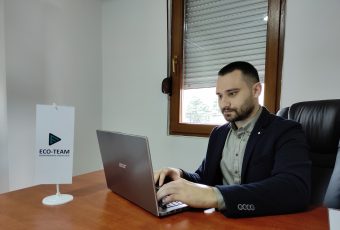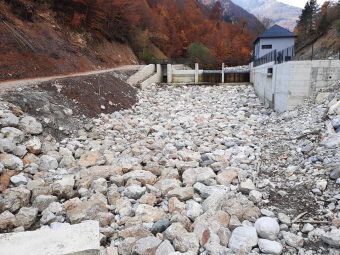
The British travel magazine Culture Trip ranked Montenegro on the list of the best sustainable destinations in 2021. That will surely attract a large number of tourists. While they enjoy the exceptional natural and cultural-historical assets of this neighboring country, an ecological team that called itself simply the Eco-team will continue to fight for an environment in which one day, as they say, a man will know how to live in harmony with nature, whether he is a visitor or a local. This NGO intends to achieve it primarily by advocating for the sustainable use of natural resources and reducing pollution. Milija Čabarkapa, executive director of the NGO Eco-team, says that they are implementing projects related to the protection of freshwater, focusing on the construction of small hydropower plants (SHPPs), the abolition of the socioeconomically unjustified system of incentives for electricity generation support and partnership with WWF Adria.
“We advocate implementing the concept of permanent protection of rivers of special biodiversity, landscape and cultural-historical significance. The Eco-team also implements projects in the field of energy and climate change, as well as public procurement in the field of the environment”.
Valuable members of the Eco-team cooperate with local communities and support them in the fight to protect rivers from the construction of SHPPs. Since they deal with public interest issues, citizens, media and institutions actively monitor their work, and thus, through direct and indirect communication, try to reach solutions in the public interest.
In focus:
“In 2020, we submitted four initiatives to the Constitutional Court regarding legal and by-law solutions for projects for the construction of small hydropower plants and approved incentives for them. For one company, any economic activity is justified where the social benefits are equal to or greater than the social costs, and an unacceptable situation is one in which the company has higher social costs than benefits, i.e. realizes economic, financial loss as in the case of SHPP”, explains Čabarkapa.

The fact that in the period from 2014 to 2018, more than 16 million euros of incentive funds were paid to privileged energy producers from SHPPs, which the citizens of Montenegro paid through electricity bills. The main incentive measures realized by electricity producers are subsidies for 12 years, guaranteed purchase of electricity and priority in taking over electricity into the energy system.
Čabarkapa says that in previous years, energy was purchased from privileged producers of electricity from SHPPs at a price that is from 61 percent to 2.14 times higher than prices on the international market, and directly to the detriment of Montenegrin citizens who for this reason have increased electricity bills.
The new Government faces a serious task of solving problems in the field of mini hydropower plants. They have promised to stop all SHPP projects, but there are many active concession agreements that the Government must terminate. With these contracts, a large number of SHPPs are planned on our rivers, which, if built, will permanently devastate watercourses. The water will end up in pipes, leaving local communities without water for basic living needs. Also, in Montenegro, there are several locations where work is underway. In some locations, locals blocked the works. For example, in the Kolasin villages of Bare Kraljske and Rečine, we have been protesting for several months against the construction of SHPPs on the rivers that flow through these places”, states Čabarkapa.
In December last year, WWF Adrija and Eco-team sent, on behalf of the residents of the village of Bare Kraljske in the municipality of Kolašin, a complaint to the Protector of Human Rights and Freedoms of Montenegro regarding the work of the Government, Ministry of Economy and Basic State Prosecutor’s Office in Kolašin because of their relationship when it comes to SHPP projects.
Prepared by: Milica Radičević
Read the story in the new issue of the Energy portal Magazine CIRCULAR ECONOMY march 2021.-may 2021.



